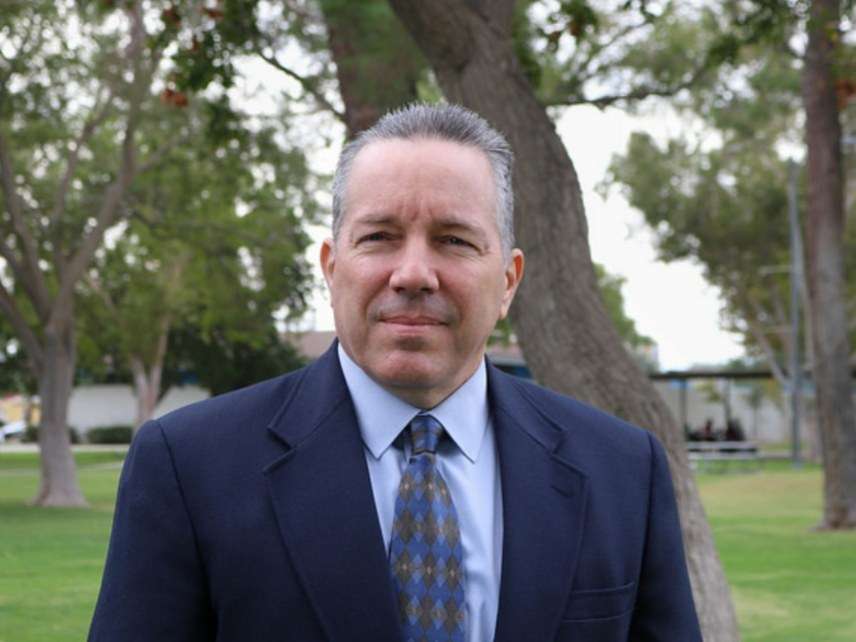Los Angeles Sheriff's Department
L.A. County's New Blue-Wave Sheriff Is No Friend to Criminal Justice Reform
Alex Villanueva openly wants to get rid of constitutional policing advisors and to conceal names of bad deputies from prosecutors.

Is Los Angeles's Democratic progressive new sheriff actually a threat to law enforcement transparency and accountability?
The November midterms turned the already very blue California even more blue. The Democrats flipped seven House seats in the Golden State, and Orange County—long a conservative stronghold in Southern California—is now going to be represented in Congress by Democrats.
This wave also flipped the sheriff's office in Los Angeles County, though that's getting much less media attention. Alex Villanueva, supported by local Democratic party organizations (but interestingly not Mayor Eric Garcetti), unseated incumbent Sheriff Jim McDonnell, who took over the department in 2014 after abuse scandals rocked the county's jail system, leading to federal charges against then-Sheriff Lee Baca and several other sheriff's department employees.
Villanueva, sworn into office Monday, ran a campaign focused on his Latino identity and progressive ties, showing support for SB 54, the law that turned California into a "sanctuary state," where government and law enforcement officials are restricted in the extent to which they can cooperate with federal immigration officials. Though to what end that actually means immigrants in the Los Angeles County will be protected from Immigrations and Customs Enforcement is probably not the extent people think: Villanueva says he won't let ICE officials wander county jails but will transfer people detained in the jails into ICE custody. McDonnell allowed ICE representatives office space within the jail system to coordinate picking up deportable prisoners. This doesn't necessarily mean fewer prisoners face deportation under Villanueva. He's just pushing ICE out of the waiting room, metaphorically.
But some other components of Villanueva's platform are pretty troubling in terms of law enforcement accountability. His campaign capitalized on the well-worn rank-and-file vs. management conflict at law enforcement agencies across the country and he is firmly on the side of those who patrol the streets. The union representing high-ranking members of the sheriff's department endorsed McDonnell. The Association of Los Angeles County Sheriff's Department endorsed Villanueva, and he's made it clear the love is mutual.
This is a concern because the LASD has had problems on both sides—both management corruption and bad behavior from deputies. It's not an either/or problem, and Villanueva is acting like it is. The rank-and-file union has been locked in a legal fight trying to stop the LASD from providing a list of deputies with histories of misconduct to prosecutors so that can decide whether to risk putting them on the stand as witnesses. Villanueva openly supports the union's efforts and is opposed to providing this list of bad deputies to prosecutors. He calls it a "fake list" and complains that the sheriff's department officers were put on the list are the result of retaliatory punishment against those who piss off management.
That's a bit of a bold claim, given that the ostensible point of this list is to help prosecutors keep cases from being jeopardized by putting cops on the stand who have a history of misbehavior that the defense can use to then undermine the district attorneys. But that's been a tactic used by police unions—see also Philadelphia—to try to protect officers from consequences, regardless of the impact on criminal cases.
There's more. In response to the jail abuse scandal, McDonnell put into place two new positions of "constitutional policing advisers" to advise the sheriff about use-of-force concerns and police disciplinary matters. Villanueva wants to dump them, complaining that they focused too much on misconduct by deputies and ignored problems with command staff. He tells the LAist that he wants to replace them with a "truth and reconciliation commission" to review wrongful convictions (which sounds like something under the purview of prosecutors, not the sheriff's department), and wrongful terminations of deputies. One of his first acts in office was to prepare to purge and replace all the top staff of the LASD.
Frankly it sounds like voters handed the reins of Los Angeles' sheriff's department over to the deputies' union itself and it sounds like he's using the language of progressives to conceal a desire to shield deputies from accountability.
Peter Bibring of the Southern California chapter of the American Civil Liberties Union (ACLU) called these plans of Villanueva's a "troubling step in the wrong direction." On Monday, Hector Villagra, executive director of the ACLU, put out a much milder statement saying, "We look forward to working with Sheriff Villanueva in eradicating deputy violence and deputy gangs, addressing racial profiling, increasing transparency, and strengthening civilian oversight over the department." The statement did not specifically critique any of Villanueva's stated positions.
Fortunately, Villanueva, unlike his predecessors, will have a tougher time trying to conceal records of misconduct by his deputies and detectives. In September, California lawmakers passed a bill that—after decades of state-mandated secrecy—opened up investigative and personnel records about police officers who get in trouble for violence or dishonesty on the job. If those men and women really were targeted as a form of retaliation by management for whistleblowing, as Villanueva claims, we may be able to find out.


Show Comments (6)